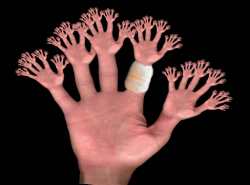 The Care Quality Commission have reported on Winterbourne View, the rogue hospital exposed in May by Panorama – so that’s alright then, isn’t it, only, of course, it isn’t. The CQC headline, ‘CQC report on Winterbourne View confirms its owners failed to protect people from abuse’ belongs to the ‘report confirms thugs are thugs’ category, and is, as many have observed, a clear case of doors being bolted after horses have fled. No wonder the CGC has been dubbed the ‘Can’t Quite Cope’ commission. The moniker – undoubtedly British Dentistry’s greatest contribution to National Lampoonery – says it all.
The Care Quality Commission have reported on Winterbourne View, the rogue hospital exposed in May by Panorama – so that’s alright then, isn’t it, only, of course, it isn’t. The CQC headline, ‘CQC report on Winterbourne View confirms its owners failed to protect people from abuse’ belongs to the ‘report confirms thugs are thugs’ category, and is, as many have observed, a clear case of doors being bolted after horses have fled. No wonder the CGC has been dubbed the ‘Can’t Quite Cope’ commission. The moniker – undoubtedly British Dentistry’s greatest contribution to National Lampoonery – says it all.
The CQC, speaking on R4’s You and Yours, took the oleaginous line, and added what will surely become known as the Cameron defence – ‘we have all been in this together’. The CQC had done its best, but it was only part of a wider system of regulation. Nor could it be expected to be in, and regulating, all care settings at all times. And here, ironically, it does have a point. In fact, more than that, it hit the nail on the head. You simply can’t regulate all of the people, all of the time.
Despite this self-evident fact, the regulatory trend over recent years have been towards more checks, with bigger better clipboards. We have the Vetting and Barring Scheme, designed to weed out boy scout botters. We have the government’s revalidation scheme for doctors, intended to spot Harold before he does a Shipman. We have Dr Foster dialling up hospital mortality data. And, of course, amongst the many others, we have the CQC clipboarding everyone, not just hospitals and care homes, but GPs and dentists too – which, of course, is another reason why they can’t quite cope.
The problem is that health care activity – Dr No knows he is stretching the scientific elastic here – is chaotic, a human quasi-fractal nightmare. At each zoom-in step, we see more of the same patterns of behaviours. And all too soon we find ourselves enmeshed in a variant of the coastline paradox – the coast gets longer as the ruler gets smaller, without limit: as the ruler approaches zero length, the coastline approaches infinite length. If the ruler is too coarse, we miss the detail; if it is to fine, we get lost in an infinite sea of data. The bottom line is we haven’t got a clue…just as the CQC staff didn’t have a clue about Winterbourne View…until, that is, a whistleblower and some helpful journalists did their job for them.
And so it is that Can’t Quite Cope monitoring is, inevitably, doomed. It will always be overwhelmed, always be the raggle-taggle army breasting the hill after the battle has been lost. Even worse, an obsession with clipboarding takes the focus away – as it signally did at Winterbourne View – from the most sensitive monitor of all – the staff.
Dr No takes a charitable view of health care workers, from porters to doctors. He has found that, in the main – there are of course more than a few sinister exceptions, individual and institutional – they care about their patients. They want the best for their patients, and are naturally offended when that does not happen. But when they are so offended, they hit, if their organisation does not respond to their concerns, a brick wall, or rather a brick dilemma: to blow, or not to blow.
It seems to Dr No that what we need to do is remove the obstacles to whistleblowers. We could, for example, reduce – not eliminate, just reduce – dumb clipboard monitoring, and replace it with intelligent monitoring: monitoring that uses the willing but currently thwarted intelligence of the whistleblower.
It wont be easy, not by a long shot. Utopian urges to ‘change the culture’ are more honourable than practical. What today’s whistleblower needs is a open channel, and protection from angry colleagues and managers. This is do-able. We could, for example, establish a National Whistleblower Centre, along the lines suggested in this sound paper by four grandees of health care whistleblowing, funded by savings from the cut back CQC. Then we might start to see the sorely needed sea change away from bungled ‘can’t quite cope’ regulation towards sharper, smarter regulation, regulation that nails the failings before the failings nail the patients.
